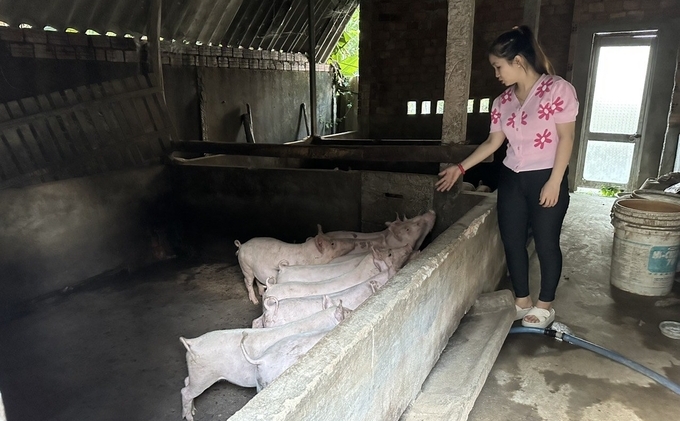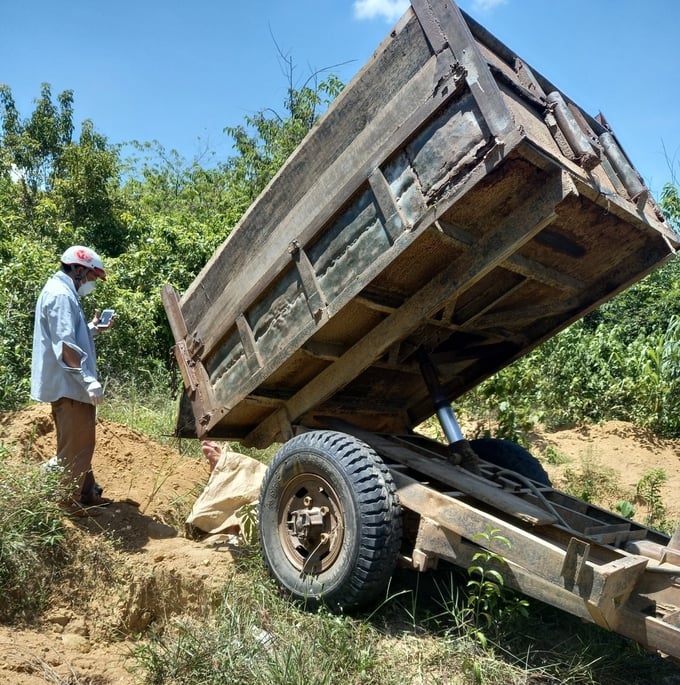June 2, 2025 | 04:45 GMT +7
June 2, 2025 | 04:45 GMT +7
Hotline: 0913.378.918
June 2, 2025 | 04:45 GMT +7
Hotline: 0913.378.918

Unit veterinary officers must take on many different tasks, especially in communes. Photo: L.K.
According to Mr. Do Van Chung, Director of the Department of Animal Husbandry and Veterinary Medicine of Quang Ngai province, before 2019, following the Law on Animal Health, the state management agency for Veterinary Medicine at the provincial level had the Department of Animal Husbandry and Animal Health; At the district level, there is a Livestock and Veterinary Station under the Department. In addition, there are veterinary staff in the commune, so animal husbandry and veterinary work, especially controlling and handling outbreaks when an epidemic occurs, is very convenient and effective.
However, from 2019 until now, the Animal Husbandry and Veterinary Station merged into the district's Agricultural Service Center; the state management function of livestock and veterinary medicine at the district level belongs to the Department of Agriculture and Rural Development or the Department of Economics. Commune-level staff merged into part-time positions titled Transport - Irrigation, Veterinary - Agricultural Extension.
Therefore, many localities cannot arrange professional people, making animal husbandry and veterinary work very difficult, especially in controlling and handling outbreaks when an epidemic occurs. The province's specialized veterinary management agencies are broken, lacking people with the expertise to advise and implement professional veterinary husbandry work.
"There is a lack of force for vaccination, slaughter control, epidemic surveillance, outbreak handling, epidemic reporting... so when there are new epidemics such as African swine fever, lumpy dermatitis suddenly occurs, the public Untimely prevention and control efforts have spread to a large area, causing huge economic losses," Mr. Chung admitted.
The fact that a commune-level official is assigned to be in charge of many different areas makes the work performed very large. Most localities hire freelance veterinary workers to coordinate the implementation whenever an epidemic occurs, or vaccination is implemented. However, this problem of hiring people is also quite difficult in many localities.

Localities in Quang Ngai say that nowadays, whenever there is an epidemic or vaccination of livestock, it is very difficult to hire people to coordinate the implementation. Photo: L.K.
Mr. Nguyen Huu Nam, Vice Chairman of the People's Committee of Nghia Thuan commune (Nghia Hanh district, Quang Ngai), said that the locality has a relatively large herd of livestock and poultry. Of which, there are about 6,700 pigs alone. Every year, the commune will organize disease vaccination 2 times.
"One veterinary officer in the commune cannot do the job, so we have to hire someone. Funding for hiring this person comes from the local budget, so it is minimal, usually around VND 200,000/1 working day. It's not worth much compared to what they (freelance veterinary workers) do outside services. So most of them don't want to do it; it's hard to find people," Mr. Nam said.
As difficult as it is to carry out veterinary tasks locally, the Sub-Department level is even more burdensome. According to regulations, the Provincial Department of Livestock and Veterinary Medicine is responsible for many areas. These include directing the construction and organization of animal disease-safe areas and facilities, areas for livestock farming, production, animal feed processing, and concentrated animal slaughter, Statistics, and assessment of damage caused by animal diseases...
According to the leader of the Department of Animal Husbandry and Veterinary Medicine of Quang Ngai province, with such a large workload, this unit only has 18 civil servants with veterinary animal husbandry expertise. Meanwhile, the current status of production and business in livestock and veterinary medicine in the area is mainly at the farm household scale. Business establishments of animal products, animal feed, veterinary medicine... are still fragmented, small, and distributed everywhere, so they lack resources to perform their assigned functions and tasks well, especially in prevention work against epidemics.
“Due to lack of resources, especially at the district and commune levels, many areas of animal husbandry and veterinary work in the locality such as quarantine, slaughter control, veterinary hygiene inspection, vaccination, etc., epidemic monitoring, and epidemic reporting lack of staff to advise, develop plans, and organize implementation," Mr. Do Van Chung acknowledged.
According to Mr. Do Van Chung, recognizing this problem, the People's Committee of Quang Ngai province has issued Decision No. 1682 on strengthening the capacity of the system of specialized veterinary agencies at all levels until 2030 in the province. Accordingly, Quang Ngai province will consolidate, consolidate, and invest in increasing the capacity and resources of the veterinary management system at all levels from the province (Department of Livestock and Veterinary Medicine), and district (animal husbandry and veterinary station), commune (veterinary staff) to meet the requirements of performing tasks effectively and following practice.
Translated by Tuan Huy
/2025/05/29/5625-12-214801_567.jpg)
(VAN) Provincial mergers in the Mekong Delta promise to streamline administration, expand inter-provincial raw material areas, and foster close linkages in agricultural value chains, benefiting both businesses and cooperatives.

(VAN) Merging Mekong Delta provinces contributes to the expansion of agricultural raw material areas, addressing previous constraints caused by provincial boundaries. Additionally, this expansion will reduce costs and strengthen linkages between businesses, cooperatives, and farmers.
/2025/05/29/1043-2-153730_145.jpg)
(VAN) The Government's policy to merge provincial-level administrative units opens up major opportunities for the Mekong Delta region to reshape its agricultural development strategy toward large-scale production, effective regional linkages, and sustainability.

(VAN) The mutual export of agrifood products between the European Union (EU) and the United Kingdom (UK) must occur again without certification, border controls or other red tape. This was agreed at the UK-EU summit.
/2025/05/22/5121-2-173645_677.jpg)
(VAN) NBSAP Tracker identifies strengths and areas for improvement in the National Biodiversity Strategy, based on each region’s priorities and capacities.

(VAN) The draft amendment to the Circular on rice export trading stipulates a periodic reporting regime for rice exporting enterprises.

(VAN) Dong Thap farmers attained an average profit margin of 64% during the summer-autumn 2024 crop (first season), while An Giang and Kien Giang farmers followed with 56% and 54%, respectively.